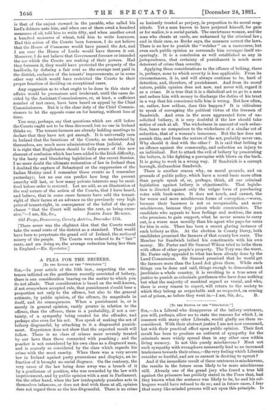A PLEA FOR THE BRIBERS.
[To THE EDITOR OF THE " SPECTATOR."]
Sia,—In your article of the 10th inst., respecting the sen- tences inflicted on the gentlemen recently convicted of bribery, there is one consideration bearing on the matter to which you do not allude. That consideration is based on the well-known, if not everywhere accepted rule, that punishment should bear a proportion not only to the offence, but also to the general estimate, by public opinion, of the offence, its magnitude in itself, and its consequences. When a punishment is, or is merely in general opinion, vastly greater in relation to the offence, than the offence, there is a probability, if not a cer- tainty, of a sympathy being created for the offender, and perhaps also even for his act. You speak of making the act of bribery disgraceful, by attaching to it a disgraceful punish. ment. Experience does not show that the expected result will follow. There is no class of crimes more severely treated by our laws than those connected with poaching ; and the poacher is not considered by his own class as a disgraced man, and is scarcely so considered by the class which regards his crime with the most enmity. When there was a very severe law in Ireland against party processions and displays, an in- fraction of it brought no social disgrace. On the contrary, the very cause of the law being done away was a breach of it by a gentleman of position, who was rewarded by the law with imprisonment, and by public opinion with a seat in Parliament. On the other hand, when the law inadequately punishes acts in themselves infamous, or does not deal with them at all, opinion does not regard them as the less disgraceful. There is no crime so leniently treated as perjury, in proportion to its moral mag- nitude. Yet a man known to have perjured himself, for gain or for malice, is a social pariah. The unvirtnous woman, and the man who cheats at cards, are unharmed by the criminal law ; and in their case, as Burke says, the manners correct the laws- There is no law to punish the " welsher " on a racecourse, but even such public opinion as surrounds him revenges itself un- sparingly. It is a conclusion as well established as any in jurisprudence, that certainty of punishment is much more deterrent of crime than severity.
Applying these considerations to the offence of bribing, there- is, perhaps, none to which severity is less applicable. From its circumstances, it is, and will always continue to be, hard of detection, and, therefore, of punishment. And from its moral nature, public opinion does not now, and never will, regard it as a crime. It is true that it is a diabolical act to go to a man and seduce him with money to discharge the duties of his trust in a way that his conscience tells him is wrong. But how often, or, rather, how seldom, does this happen ? It is ridiculous to speak of corrupting the political virtue of the freemen of Sandwich. And even in the more aggravated form of un- solicited bribery, it is very doubtful if the law should take notice of such at all. The wickedness in amount of such seduc- tion, bears no comparison to the wickedness of a similar act of seduction, that of a woman's innocence. But the law does not punish this, and from the nature of the act, probably never can.. Why should it deal with the other ? It is said that bribing is an offence against the community, and seduction an injury to an individual. But to attack the evil of bribery by prosecuting- the bribers, is like fighting a porcupine with blows on the back.. It is going to work in a wrong way. If Sandwich is a corrupt borough, disfranchise Sandwich.
There is another reason why, on moral grounds, and on grounds of public policy, which have a moral basis more often than people speak of, or, perhaps, think, all our criminal legislation against bribery is objectionable. That legisla- tion is directed against only the vulgar form of purchasing- votes with bank-notes. It does not touch, and cannot, the far worse and more mischievous forms of corruption,—worse,. because their baseness is not so recognisable, and more- mischievous, because they poison whole communities. The candidate who appeals to base feelings and motives, the man, who promises, to gain support, what he never means to carry out, is a worse man morally than his agent who pays for votes- for him in coin. There has been a recent glaring instance of such bribery as this. At the election in County Derry, both candidates promised the farmers of that county low rents. The- Member for Sandwich bribed his constituents with his own money. Mr. Porter and Sir Samuel Wilson tried to bribe them with offers of other people's property. The Tory was the worst. Mr. Porter only appealed to what has been already done by the Land Commission. Sir Samuel promised that he would get the farmers more than the Land Act gives them. While such! things can be done and said, things enough to demoralise and, jacobinise a whole country, it is revolting to a true sense of justice to punish as criminals gentlemen who have done nothing. but what the majority of mankind regard as venial, and who,. there is every reason to expect, will return to the society to which they belong as respectable and as respected, on coming out of prison, as before they went in.—I am, Sir, &c., B.






































 Previous page
Previous page